NEW YORK—Donald Trump, former president and frontrunner for the Republican presidential nomination in 2024, pleaded not guilty in New York on April 4 to an unprecedented indictment brought by the Manhattan district attorney.
News of the historic indictment on March 30 set off several days of media mania which culminated on April 4 in coverage of Trump’s motorcade ride through his beloved hometown en route to voluntarily surrender himself at the offices of New York County District Attorney Alvin Bragg and hear the charges against him at the New York Supreme Court.
In a return to the saga that began shortly after he won the 2016 election, the district attorney charged Trump with 34 counts of falsifying business records in connection to a payment for a non-disclosure agreement signed by adult entertainment actress Stormy Daniels and Trump’s then-attorney, Michael Cohen.
For a president who faced an unprecedented second impeachment, a yearslong aggressive inquiry into alleged collusion with Russia, and the raid of his private residence, the Manhattan indictment is the latest, most dramatic episode in what he and his supporters see as the weaponization of government against a political opponent.
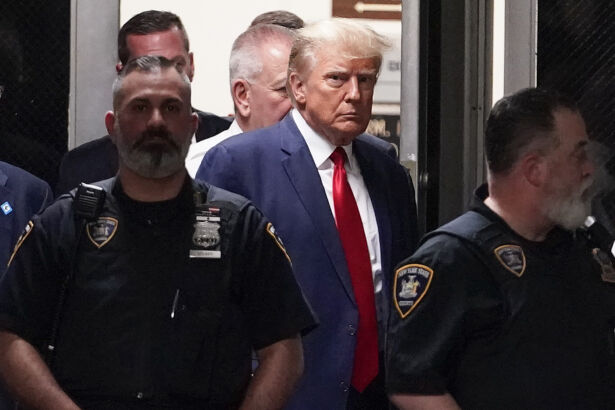
The charges by Bragg, a Democrat elected in a deep blue county, are a particular fit for the pattern because the district attorney has only recently directed his office to not prosecute certain armed robberies, burglaries, prostitution, and drug offenses.
The charges against Trump all cite the same statute: New York State Statute 175.10, falsifying business records in the first degree. Each of the 34 counts deals with the paper trail related to the payments that a Trump entity made to Cohen, including business ledger entries, invoices, and checks.
In a news conference after the arraignment hearing, Bragg alleged that Trump falsified business records with an intent to cover up state- and federal-level crimes related to campaign contributions. Those alleged crimes, according to Bragg, included payments to Daniels and Karen McDougal, a model who received a payment from the publisher of the National Enquirer for the rights to her story about an alleged affair with Trump.
Trump has previously said that the payments weren’t made with campaign funds. The indictment doesn’t offer any evidence of Trump paying McDougal.
“Under New York state law, it is a felony to falsify business records with an intent to defraud and an intent to conceal another crime. That is exactly what this case is about, 34 false statements made to cover up other crimes,” Bragg said at the news conference.
“These are felony crimes in New York state, no matter who you are. We cannot and will not normalize serious criminal conduct.”
Trump’s attorneys, speaking to reporters outside the courthouse, said the case is unprecedented not only because it concerns a former president, but for other reasons as well.
“A state prosecutor is prosecuting a federal election law violation that doesn’t exist according to federal election law officials,” said Joe Tacopina, one of three Trump attorneys who attended the hearing.
The judge, Juan Merchan, didn’t set a trial date. The prosecutors asked for the trial to take place in January 2024 and Trump’s attorneys requested April 2024. Bragg’s office will have 65 days to file discovery materials. The defense will have until Aug. 8 to file all pretrial motions.
Trump’s attorneys have already indicated that they’ll file a motion to dismiss the case.
Outside the Courthouse
In a small park outside the courthouse in downtown Manhattan, hours prior to Trump’s arrival, police set up barricades to separate Trump’s supporters from those celebrating his indictment. With heavy news media presence in and around the park, arguments between Trump’s supporters and counterprotesters quickly drew dozens of cameras.
The scene grew cacophonous and tense with the arrival of Rep. Marjorie Taylor Greene (R-Ga.), who spoke briefly in Trump’s defense before handing the bullhorn to a group of conservative pundits, including Jack Posobiec. A team of New York Police Department officers briefly struggled to keep the crowd of media and attendees at bay as Greene made her way atop a bench.
“I came to peacefully protest against the persecution of an innocent man,” she said. “And not just any man. This is the former president of the United States of America, and the government has been weaponized against him.”
A handful of hecklers blew whistles and shouted obscenities as Greene spoke.
“Every American should take a stand. This is what happens in communist countries. Not the United States of America,” she said. “Donald Trump is innocent. This is election interference.”
Trump first spoke of the potentiality of an indictment on March 18, writing on Truth Social that he expected to be arrested the following week.
“Protest, take our nation back!” he said at the time.
The prosecutors secured an indictment against Trump on March 30, according to the former president’s attorneys.
Trump Tower
The scene outside of Trump Tower in Midtown Manhattan was more subdued than the cacophony next to the courthouse. Television cameras livestreamed footage of the tower entrances throughout the morning. Trump waved and pumped his fist upon exiting the tower, which was the site of his 2016 presidential campaign announcement and the early days of the presidential transition.
It was in his office in Trump Tower in 2017 that then-FBI Director James Comey briefed Trump about a dossier of unverified allegations that the bureau was already investigating. The dossier turned out to have been funded by the Clinton campaign and composed by a Russian national working for a former British spy. The yearslong Russia investigation that followed failed to verify any of the dossier’s allegations about Trump.
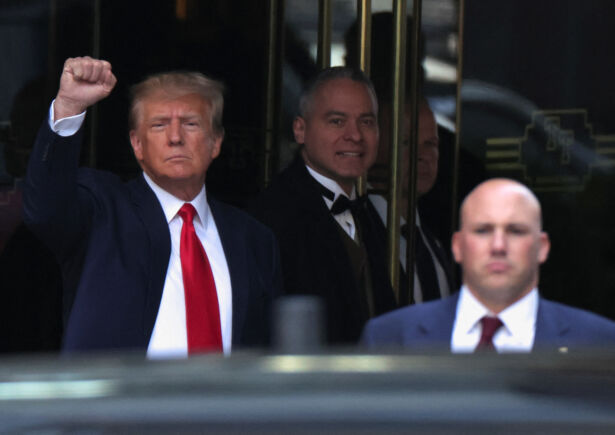
In a Truth Social message sent while he was still en route to the courthouse, Trump wrote: “Heading to Lower Manhattan, the Courthouse. Seems so SURREAL—WOW, they are going to ARREST ME. Can’t believe this is happening in America. MAGA!”
The Secret Service motorcade arrived at the courthouse at roughly 12:20 p.m. After exiting a black SUV, Trump waved toward a battery of cameras set up across the street from the roadblock and walked briskly up the street into a side door of the building at 100 Centre Street.
In a White House briefing that began about the time Trump arrived downtown, White House press secretary Karine Jean-Pierre declined to comment on the indictment.
“Trump’s indictment is not our focus,” Jean-Pierre said. “Our focus right now is American people and how to lower prices.”
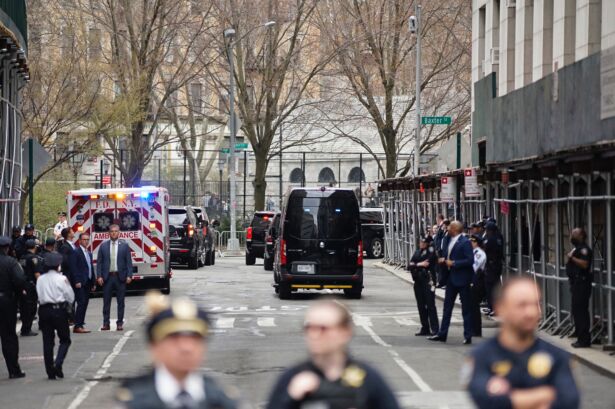
2024 Race
All of Trump’s major Republican 2024 potential primary opponents, including those who haven’t yet announced a run, condemned the indictment and defended the former president. The cohesion, at a time when the frontrunner would usually be perceived in a vulnerable spot, suggests that Republicans are genuinely concerned about government weaponization. The candidates also may be playing a delicate game of running on the Trump agenda while running against the man who galvanized unyielding passion for the platform among the base of Republican voters.
Florida Gov. Ron DeSantis called the move by Bragg un-American. Former Vice President Mike Pence, speaking on CNN the same evening, called it “a bad decision by a political prosecutor.”
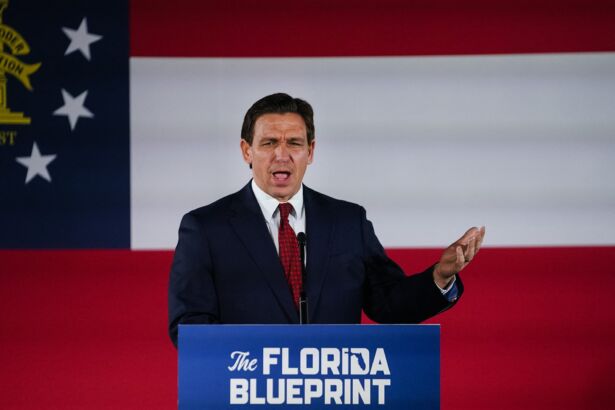
Former South Carolina Gov. Nikki Haley, who, unlike Pence and DeSantis, has made her presidential bid official, said, “This is more about revenge than it is about justice.”
There’s no consensus on what effect the indictment will have on the 2024 election. The Trump campaign raised $7 million in the three days following news of the indictment, according to Trump campaign senior adviser Jason Miller. For Trump’s supporters, the parallel between the treatment of Jan. 6, 2021, protesters and the April 4 arrest could validate the former president’s warnings about a government that has turned against a swath of the people whom it’s supposed to serve.
“They’re not coming after me, they’re coming after you—I’m just standing in their way,” Trump’s Truth Social profile bio states.
In the case of Stormy Daniels, the hand of justice appears to have struck at those who went after Trump. Daniels’s attorney, Michael Avenatti, enjoyed months of media fame and glory before facing indictments in three criminal cases. He was found guilty of attempted extortion, wire fraud, aggravated identity theft, and obstruction. He’s in prison with a release date set for March 2, 2036.
Meanwhile, on April 4, the 9th Circuit Court of Appeals awarded the former president nearly $122,000 in attorney fees from Daniels over a failed defamation suit she brought against Trump in 2018. Trump’s son, Eric, tweeted that the amount is in addition to the roughly half a million dollars that she already owes his father.
The key witness against Trump will be Michael Cohen, his former attorney. Cohen went to prison in May 2019 after pleading guilty to campaign finance charges linked to the Stormy Daniels non-disclosure agreement. A former Federal Elections Commission chairman told The Epoch Times in August 2018 that the charges Cohen pleaded guilty to weren’t crimes.
Trump Responds
In his first public statement after pleading not guilty, Trump wrote on Truth Social that the New York County district attorney had “no case.”
“The hearing was shocking to many in that they had no ‘surprises,’ and therefore, no case,” he added.
“Virtually every legal pundit has said that there is no case here. There was nothing done illegally!”
Meanwhile, in a speech given from the ballroom of his Mar-a-Lago estate in Palm Beach, Trump warned that the United States had sunk to the level of the “old Soviet Union.”
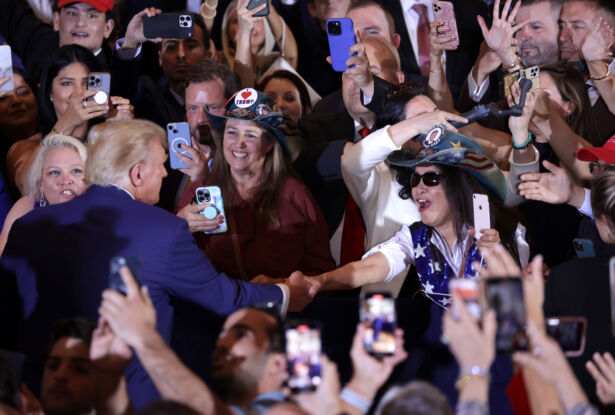
“I never thought anything like this could happen in America,” Trump said, speaking to the cheers of a fired-up, invite-only audience of about 500 about two hours after returning from Manhattan.
“The only crime that I’ve committed is to fiercely defend our nation,” he said.
In his speech, Trump maintained his innocence, saying Bragg has “no case” against him.
“As it turns out, everyone who has looked at this case, including RINOs, and even hardcore Democrats, says there is no crime and it should never have been brought. Never have been brought.”
“It’s an insult to our country,” he added, “and the world is already laughing at us.”
Legal Experts Weigh In
John Banzhaf III, a professor emeritus at George Washington University Law School, said he wouldn’t be surprised if the seemingly excessive charges will induce jurors to acquit Trump. They may see the whole case as unfair.
“I think even a jury which may not have too much legal expertise is going to look over at this and say, ‘Well, this is repetitious,’” Banzhaf told The Epoch Times.
He used this analogy: If a person was accused of a bank robbery, instead of charging him with robbing one bank, the prosecutor would load up 33 other charges, such as “he crossed the street against the red light, was double parked, shot off his gun, and he carried a gun when he shouldn’t,” Banzhaf said.
“But, you know, to most people, they would say that was one crime, one bank robbery.”
Banzhaf, ironically, was the attorney who filed a complaint against Trump in Georgia, leading to an investigation there for alleged interference in the 2020 presidential election.
That investigation is still ongoing, and Banzhaf thinks the New York case could have an adverse effect on the Georgia case. After dozens of charges were filed against Trump in New York, the notion that more could be piled on in Georgia or elsewhere can add to the impression that Trump is a political target, which doesn’t sit well with jurors, Banzhaf said.
That’s why he thinks there’s a risk of “jury nullification,” in which jurors rebel against a seemingly unfair prosecution regardless of the evidence.
Mike Allen, a former judge and prosecutor in Ohio, said the New York case might not even make it to trial.
“I think there’s a very good chance” that Trump’s team will prevail on a motion to dismiss, “which will be filed post-haste,” Allen told The Epoch Times.
Trump’s lawyer, Joe Tacopina, has already alluded to the filing of several motions to dismiss, including one based on prosecutorial misconduct and selective prosecution.
Political Impact
Trump raised more than $8 million in the four days after it was announced that a grand jury had indicted him. Trump’s fundraising haul and impressive surge in the polls bolstered the apparent conventional political wisdom about the likely political impact of the Bragg indictment, as expressed during a Fox News interview on the court date with Karl Rove, who was chief political strategist and deputy White House chief of staff under President George W. Bush.
“This has helped him clearly in the race for the [2024] Republican presidential nomination, all the polls show so. He’s demonstrated the ability to turn this into a massive fundraising effort. I’ve received 11 emails from the Trump campaign in the last 24 hours,” Rove said.
“It is not helpful for the long term, however. If you look inside the ABC-Ipsos Poll, 16 percent of Republicans thought he should have been indicted. That’s one out of every six Republicans. And how many Independents who did not vote for him last time around are going to be excited by this issue, even if it’s resolved in his favor, since it involves hush-money payments to a porn star?”
Interviews by The Epoch Times of political strategists and elected officials in both major political parties following the indictment’s unsealing suggest the conventional wisdom may prove only half right.
Cristina Antelo, a senior Democratic strategist, and Brian Darling, a senior Republican strategist, both told The Epoch Times they see Trump benefitting both short and long term.
“I think this helps his narrative all around. He’s the victim. And now he’ll be the martyr,” Antelo said.
Darling said: “I think this case is a tempest in a teapot. Big deal today, but a story that will quickly become a boring battle of legal briefs. The other Trump cases may impact the election, but not this case.”
Christy Setzer, another Democratic strategist, questioned whether Trump will actually benefit in either the short or long term.
“I’m not even sure it helps him politically in the short-term—at least not among all voters. Sure, it fires up some GOP primary voters on his behalf, but no one that wasn’t already with him. And he loses support from those who weren’t already in his circle: regular people don’t want a 34-time-criminal as president,” Setzer observed.
David Molina, another Democratic strategist, said it’s too early to see how the indictment of Trump will affect the former chief executive’s political prospects. “I think there needs to be more discussion among voters,” Molina told The Epoch Times.
Rep. Josh Brecheen (R-Okla.) said: “Common sense tells us that Donald Trump has announced for president in 2024 and this indictment would not be happening if he wasn’t running. Donald Trump is a fighter and he is going to come out swinging. He’s a fighter, he’ll go the distance. This guy has shown he’s got energy.”
Brecheen, one of the 20 House members who secured a host of conservative reforms in how the lower chamber of Congress functions during January’s heated speaker of the House contest, added that he believes “the American people are tired of seeing this for his family’s sake, this constant bombardment against Trump.”
From The Epoch Times
